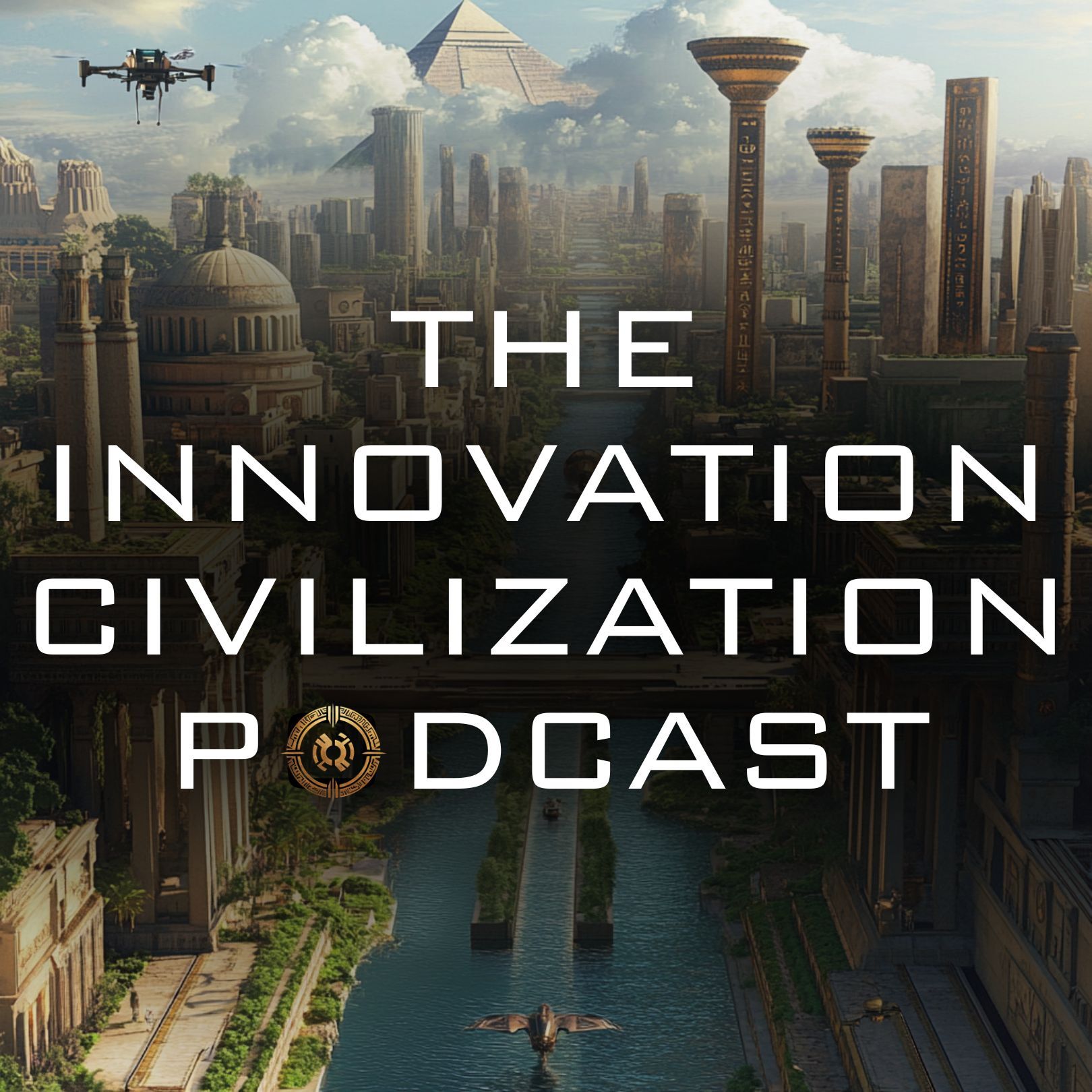Episodes

14 hours ago
14 hours ago
We’re joined by Tomicah Tillemann, former U.S. State Department official and President of Project Liberty, for a conversation on the entrenched problems of the Internet and how to rebuild it from the ground up with digital rights, sovereignty, and decentralization at its core.
Tomicah has spent decades working on governance, blockchain innovation, and digital infrastructure. As a key architect behind the Decentralized Social Networking Protocol (DSNP) and the Frequency blockchain, his mission is to restore agency, trust, and dignity to the digital public square.
We dive into:
-Why today's internet operates like a digital feudal system and how to break free
-The rise of the attention economy vs. the potential of an "intention economy"
-How Project Liberty's Frequency infrastructure is helping millions regain control of their data
-The People's Bid to acquire TikTok and what it means for platform ownership
-Why AI agents must serve individuals not corporations
-Lessons from blockchain land registries, data scraping lawsuits, and digital identity
Key Takeaways from the Episode:
1. The Internet Is Broken by Design: Big platforms dominate because they've captured our data and social graphs. Tomicah argues this has led to a neo-feudal internet where users generate value but own nothing.
2. The Path to Digital Sovereignty Starts with Shared Infrastructure: Through DSNP and Frequency, Project Liberty is building a protocol layer where users control their identities and data, independent of any platform.
3. Attention Economy vs. Intention Economy: We’re fed content designed to addict us. What if platforms instead let us define what we want and curate our own algorithms?
4. Why Project Liberty Could Transform TikTok: If successful in acquiring TikTok, Tomicah’s team would migrate 170M users onto Frequency, allowing data portability, shared economic upside, and participatory governance.
5. AI Agents Should Work for Us, Not Big Tech: Like Kurt Flood challenging MLB’s reserve clause, Tomicah believes users deserve AI agents that act as fiduciaries, not surveillance tools.
6. Open Models Must Be Paired with Compensation: Even when AI scrapes public data, individuals should benefit economically. New systems can recognize digital labor and creativity.
7. Blockchain Still Holds Real-World Potential: From land registries to stablecoins, decentralized tech offers breakthrough solutions, especially in emerging markets where institutions are weak.
8. Decentralized Identity Is Key to Truth: In an AI-saturated world, verifying authenticity is critical. Frequency lets posts be cryptographically validated without storing full data on-chain.
Timestamps:
(01:53) – What’s wrong with the internet? A history of digital feudalism
(04:11) – Network effects and the value users create but never capture
(07:03) – Shared social graphs vs. platform monopolies
(09:00) – Why platforms manipulate us: inside the attention economy
(10:32) – Designing an intention-based digital experience
(15:13) – What Frequency is and why millions are using it
(18:35) – How Frequency enables social graph portability for developers
(19:20) – Comparing DSNP to other decentralized networks (e.g. BlueSky)
(22:19) – The good and bad of LLMs—and how to steer them responsibly
(27:51) – Should OpenAI pay us for using our data? A digital labor argument
(29:34) – Why we need AI agents that act as fiduciaries
(31:43) – What a decentralized TikTok would look like
(31:55) – Governance, monetization, and the shift to user ownership
(35:19) – Blockchain for land titles: a Global South use case
(37:55) – Why stablecoins are money for the internet
(39:01) – Identity and authenticity: how Frequency verifies truth online
(41:38) – Rating U.S. crypto policy: regulation, innovation, and FTX fallout
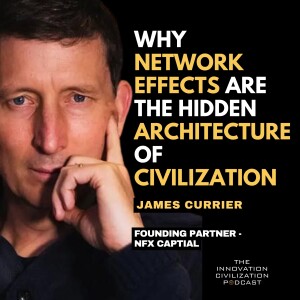
Saturday Jun 28, 2025
Saturday Jun 28, 2025
We're joined by James Currier who explains how ‘network effects’ shape our economies, tech, civilisation and how to master that to our advantage.
James is a five-time Founder, an angel investor in DoorDash, Lyft, and Patreon, and a Founding Partner at NFX. Before becoming an investor, James was the co-founder and CEO of Tickle, one of the internet's first successful user-generated companies.
From Metcalfe’s Law to the rise of AI-powered startups, we explore how the invisible laws of networks explain why some companies scale exponentially while others fade out and why understanding these forces is key to building anything lasting in the 21st century.
James has backed some of Silicon Valley’s most iconic startups and coined frameworks that are now industry standards. From early internet marketplaces to AI agents and Web3 protocols, his insights map out how startups win by designing for virality, defensibility, and system-level scale.
We dive into:
• The 17 types of network effects; from marketplaces to expertise networks, and how to build them into your product.
• The collapse of traditional moats in the digital age and what defensibility means in the era of AI.
• Why companies like OpenAI and Salesforce are embedding themselves into users’ lives to build lasting leverage.
• The rise of “3-person unicorns” and how AI is accelerating startup formation and shrinking team sizes.
• How founders can think about viral growth in a world where old playbooks (like Craigslist hacks) no longer work.
• Lessons from failure: why even with network effects, execution is everything.
• What AI bubbles mean for value creation and why James loves them.
• How to survive and thrive in a noisy world: hitting it hard, identifying “technology windows,” and creating high-leverage product experiences.
Key Takeaways from the Episode:
1. Network Effects Are the New Physics of Business:
James breaks down why 70%+ of value in tech comes from companies that embed network effects and why founders need to build products that get stronger with every new user.
2. 17 Distinct Types of Network Effects:
From classic telephone lines to software platforms and even Toyota’s repair ecosystem, we explore the taxonomy of modern network effects, including marketplace, platform, expertise, and embedding effects.
3. Defensibility in the AI Era:
With generative AI becoming a commodity, the real moat is not the model but embedding, data ownership, and network density. OpenAI’s memory feature, for example, is a classic embedding play.
4. How Salesforce, Uber, and Facebook Reinforce Their Moats:
Learn how these giants layered multiple defensibilities scale, brand, embedding, and networks to dominate their markets.
5. The “Technology Window” Model:
Massive companies are born not from marketing innovation but from catching the right tech wave just as we saw with the internet, social media, and now AI.
6. What Most Founders Get Wrong About Virality:
It’s not about shouting louder, but about building value that spreads organically through “shrew-like” constant motion experimenting, iterating, and finding attention before the channel closes.
7. The Rise of AI-Native Companies:
The best startups of the 2020s will be “AI-first,” doing with 3 people what used to take 300 reshaping business models, hiring, and even venture capital itself.
8. Why Founders Must Love the Craft, Not Just the Exit:
Great companies are built by people obsessed with the product and the mission not just chasing valuation multiples.
Follow our host on Linkedln to know more or subscribe to our emailing list to get new episodes directly into your inbox.
Timestamps:
(00:00) – Introduction to James Currier and the importance of network effects
(02:15) – Metcalfe’s Law, Reed’s Law, and why networks explain society
(04:05) – How 70%+ of tech value comes from network effects
(07:50) – The 17 types of network effects (and why expertise matters)
(12:20) – How Salesforce embedded defensibility through platform strategy
(16:55) – Investing in businesses that build network effects
(18:45) – Network effects vs. AI commoditization: what really matters
(23:05) – Why defensibility is about product strategy, not hype
(27:30) – The coming wave of “3-person unicorns”
(31:00) – Will UBI be necessary? James predicts capitalism will adapt
(34:00) – How product quality = speed to value (not just shipping fast)
(36:30) – The evolution of viral growth tactics in a noisy world
(40:45) – The “technology window” thesis: where real leverage comes from
(44:20) – Thoughts on crypto, Web3, and reinventing finance
(46:10) – What motivates great founders (hint: it’s not money)
(49:00) – James’ advice to young people on STEM, self-awareness, and emotional intelligence
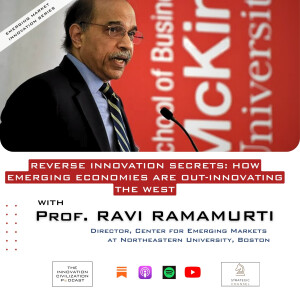
Saturday May 24, 2025
Saturday May 24, 2025
We’re joined by Professor Ravi Ramamurti, founder and director of the Center for Emerging Markets at Northeastern University in Boston, who’s one of the world’s leading experts on innovation in emerging economies.
Professor Ramamurti who along with his co-author coined the term ‘reverse innovation’ — the phenomenon where innovation flows not from West to East, but from developing countries upward into wealthier markets. In this wide-ranging conversation, he challenges long-held assumptions about who innovates, how innovation spreads, and what lessons emerging markets are teaching the world.
We dive into:
- How reverse innovation has become a mainstream force, from portable ultrasounds to healthcare delivery models.
- What made India’s hospitals 90% cheaper than the U.S. while matching quality.
- The rise of China as a global innovation leader in EVs, solar, AI, and biotech.
- How internal competition and STEM education give China an edge.
- What separates emerging market multinationals from their Western counterparts.
- Why globalization might retreat in the West but accelerate across the Global South.
- The role of business model innovation, not just technical R&D, in driving growth.
- What policymakers in emerging economies should focus on to unlock innovation.
This episode is part of the Emerging Market Innovation Series, created in collaboration with Strategic Counsel, and also features Hafidzi Razali, founder and CEO of Strategic Counsel.
Key Takeaways from the Episode:
1. Innovation Is Reversing Direction: Emerging markets are no longer just catching up—they’re now originating impactful innovations that reshape global industries.
2. Business Model Innovation Matters: From mobile payments to frugal healthcare, the biggest breakthroughs often come not from new tech, but from rethinking cost and access at scale.
3. China Is Now a Global Innovation Engine: Whether it’s batteries, solar, AI, or pharmaceuticals, China is leading with original ideas—not just copycat models.
4. Internal Competition Fuels Innovation: China’s provinces, companies, and universities are in constant competition, making it one of the most dynamic innovation ecosystems in the world.
5. Emerging Market MNCs Start Differently: Unlike Western firms built on tech superiority, EMNCs often scale through local problem-solving, cost innovation, and process excellence.
6. Don’t Underestimate South-South Trade: As Western markets close, emerging markets may open up to one another, forming a new kind of globalization led from the Global South.
7. Innovation Needs State Support — and Deregulation: Countries need smart deregulation, investment in human capital, and openness to global ideas to create fertile ground for local innovation.
8. The AI Era Will Shake Up Everything: Professor Ramamurti shares early thoughts on how AI could redefine software economies like India’s and change the geography of work.
(00:00) - Intro
(01:39) - What is Reverse Innovation?
(02:55) - What sparked Europe’s rise in the 19th century—and is the West now in decline?
(09:35) - Examples of Reverse Innovation
(14:10) - What are some original innovations from emerging economies that led global trends?
(17:01) - Why are business model innovations just as critical as technical breakthroughs?
(18:15) - Is China still reliant on Western education for innovation, or has it built its own R&D ecosystem?
(20:17) - Do emerging economies need to copy before they can truly innovate?
(22:49) - Is local competition between Chinese municipalities driving the country’s innovation boom?
(25:53) - Is China’s tech dominance threatening local industries in Southeast Asia?
(28:01) - What makes emerging market multinationals (EMNCs) different—and potentially better—than Western MNCs?
(30:31) - As labor costs rise, how can China and emerging economies stay competitive in manufacturing?
(32:26) - Can Latin America rise to global tech prominence like China—and what stands in its way?
(34:06) - Are Latin American governments investing in local innovation like East Asian state-owned giants do?
(35:41) - What should emerging market policymakers do to spark innovation and global competitiveness?
(37:38) - How should emerging markets innovate in a world moving away from globalization and free trade?
(40:37) - Is globalization making rich countries lose their edge while manufacturing hubs gain design power?
(43:38) - What groundbreaking research is coming out of the Center for Emerging Market Studies at Northeastern University?
(45:52) - Outro
Join us for a powerful and myth-busting discussion with Professor Ravi Ramamurti as we explore the next chapter of global innovation from the perspective of the rising world.
Follow our host on Linkedln to know more or subscribe to our emailing list to get new episodes directly into your inbox.
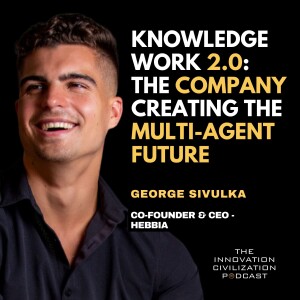
Saturday Apr 26, 2025
Saturday Apr 26, 2025
We’re joined by George Sivulka, Founder and CEO of Hebbia, for a conversation on how does the future of white collar work look like with multi-agents. Hebbia is backed by some of the most legendary technology investors of our generation including Peter Thiel (early investor: Paypal, Facebook), Marc Andreesen (early investor: Airbnb, Github, Coinbase), Eric Schmidt (ex-CEO Google), Jerry Yang (Co-founder Yahoo).
George’s background from Stanford’s PhD program, combined with his work at the cutting edge of AI meta-learning, has led him to a bold mission: to build Hebbia into a generationally important company that captures the full power of the AI revolution, not through chatbots, but through entirely new interfaces for serious, complex work.
We dive into:
- What does the future of white collar/knowledge work look like
- What the future UX/UI of Agentic AI might be (beyond chatbots).
- How Hebbia uses multi-agent orchestration to tackle tasks like investment research, drug discovery, and complex analysis.
- How Hebbia solves hallucination by "citing first, generating second."
- Why George believes AI won't eliminate jobs, but will transform how we work—and why humans will always find new ways to create value.
- The lessons George has learned from investors like Peter Thiel and Eric Schmidt about building great companies.
We also discuss deeper trends like the geography of AI data centers, the future of inference scaling laws, and why the real competitive advantage won't be technology alone — but taste, orchestration, and human-AI collaboration.
Key Takeaways from the Episode:
1. Chatbots Are Just the Beginning:
George explains why chat is a weak UI for serious work—the future will be spreadsheet-like, matrixed, and human/agent collaborative.
2. Multi-Agent Orchestration is Key:
Hebbia focuses on orchestrating many AI agents and humans together to handle truly complex, multi-hop tasks across domains.
3. Hallucination-Free AI:
Hebbia flips the model—retrieving and citing information first, then generating outputs—to ensure accuracy and trust in critical workstreams.
4. AI Will Augment, Not Replace Humans:
Work will shift from purely human to hybrid models, with humans and AI agents collaborating fluidly rather than one replacing the other.
5. Taste and Human Judgment Will Matter More Than Ever:
As software creation becomes ubiquitous, taste, creativity, and judgment will be the new moats for great companies.
6. The Importance of Geopolitics in AI Infrastructure:
George highlights why where data centers are located — and who controls compute — will be a defining factor for global AI leadership.
7. Building for the Entire Planet, Not Just One Nation:
George’s vision for Hebbia is a global platform for all humanity, regardless of geopolitical shifts.
Timestamps:
(00:00) - Intro
(01:48) - Why is Hebbia a generationally important company shaping the future of civilization?
(04:23) - Is the chatbot interface the wrong path for the future of AI user experiences?
(06:45) - What core problem is Hebbia solving that current LLMs and AI tools haven’t addressed yet?
(09:34) - How does Hebbia tackle AI hallucinations?
(13:10) - What will a multi-agent AI future look like for everyday users in the next decade?
(15:00) - Will AI replace white-collar jobs first—and what does the future of knowledge work really look like?
(19:20) - Is the AI revolution truly different because it introduces general intelligence beyond past technologies?
(23:09) - Is the decentralization of knowledge creating a new wave of better scientists outside traditional institutions?
(24:11) - Is the rise of no-code and ubiquitous software creation signaling the end of traditional B2B SaaS?
(26:54) - How do legendary investors like Eric Schmidt, Peter Thiel, and Jerry Yang influence Hebbia’s strategy and vision?
(28:54) - What makes Hebbia stand out as multi-agent AI technology rapidly advances?
(30:32) - What AI trend are people not paying enough attention to?
(32:31) - How are global shifts in trade and politics shaping the future of AI and company building?
(34:25) - How are customers measuring real ROI from their AI investments amid today’s AI boom?
(36:23) - Is the true value of AI hidden in the new possibilities it unlocks, beyond just faster tasks?
(37:19) - Outro
Join us for this electrifying conversation with George Sivulka, where we explore the frontier of AI-human collaboration, the future of work, and how to build enduring technology companies.
Follow our host on Linkedln to know more or subscribe to our emailing list to get new episodes directly into your inbox.
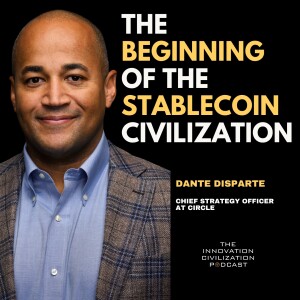
Saturday Apr 12, 2025
Saturday Apr 12, 2025
(00:00) - Intro
(01:28) - What is Stablecoin?
(02:15) - How does decentralized digital money differ from early platforms like PayPal?
(03:46) - How does money actually settle using SWIFT and traditional banking systems?
(05:47) - Why is the traditional global settlement system a black box—and what makes it so outdated?
(11:10) - Why does the world need stablecoins in a modern financial system?
(16:56) - Why are stablecoins like USDC gaining massive traction in emerging markets?
(20:29) - How do mobile money systems like M-Pesa compare to USDC in emerging markets?
(23:32) - Is USDC revolutionizing remittance corridors through partnerships in emerging markets?
(27:12) - Will USDC become a part of everyday banking and be usable at points of sale?
(35:47) - Does USDC operate on a full-reserve model instead of fractional reserve banking?
(38:39) - Is USDC’s future too dependent on the U.S. dollar’s global reserve currency status?
(45:59) - Can central banks like the Bank of England issue digital currencies on open-source USDC rails?
(48:59) - What would a strategic Bitcoin reserve mean for U.S. monetary policy and global finance?
(51:26) - Is the U.S. strategy to dominate digital finance through both USDC and Bitcoin reserves?
(55:36) - What happens to local currencies if global citizens start holding USDC instead?
(59:13) - Can USDC inflows help strengthen foreign exchange reserves in emerging markets like Kenya?
(62:32) - What does the future of money and daily finance look like by the year 2100?
(64:54) - What key regulations are needed now to shape the future of digital finance?
(66:23) - Outro
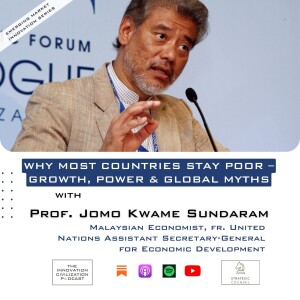
Saturday Mar 29, 2025
Saturday Mar 29, 2025
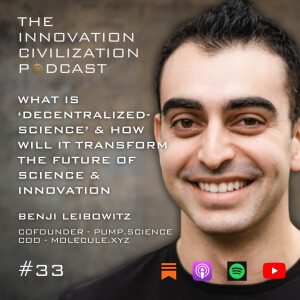
Friday Mar 14, 2025
Friday Mar 14, 2025
(00:00) - Intro
(01:27) - What is decentralized science, and how does it challenge traditional research models?
(03:25) - What inefficiencies in traditional science does decentralized science aim to solve?
(05:31) - How is decentralized science redefining intellectual property in research and innovation?
(12:18) - In today’s fast-moving biotech landscape, does drug exclusivity still hold up for 20 years?
(19:18) - Are early-stage anti-aging drugs the future of longevity science?
(24:09) - How does decentralized science ensure research credibility and scientific rigor?
(26: 08) - In a world of fractionalized IP, how do researchers protect and govern their innovations?
(31:53) - Is decentralized science a revolution or just another crypto scam?
(33:47) - Can long-term scientific research thrive in the fast-paced, hype-driven crypto market?
(44:42) - How can decentralized science integrate with traditional research institutions and publishing models?
(47:44) – What career paths and recognition exist for researchers in decentralized science?
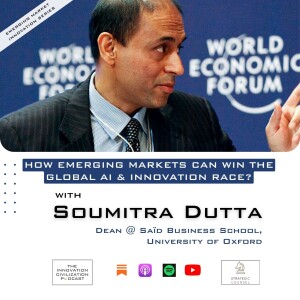
Saturday Mar 01, 2025
Saturday Mar 01, 2025
Innovation is often seen as the driving force behind economic growth, but how can emerging markets build successful innovation ecosystems? We explore the key ingredients required to foster innovation at a national level.
Soumitra Dutta has worked at the intersection of academia, business, and policy, serving as the Dean of leading business schools and advising governments on how to create innovation-driven economies. He shares key insights on how emerging markets can learn from global success stories and adapt them to their own unique environments.
We dive deep into:
• Defining Innovation: How innovation differs from invention and why successful market adoption is key.
• National Innovation Strategies: Why political leadership plays a crucial role in fostering innovation.
• The Role of Governments: How government policies, procurement, and infrastructure investments can catalyze innovation.
• Emerging Market Leadership: Lessons from countries like Singapore, China, and Finland on transforming national economies.
• The Role of Talent: Why attracting, developing, and retaining skilled professionals is critical for sustainable innovation.
• Measuring Innovation: A breakdown of the Global Innovation Index and how emerging markets can climb the rankings.
• Collaboration vs. Competition: Why innovation thrives in open, knowledge-sharing ecosystems.
Key Takeaways from the Episode:
1. Innovation Requires Strong Leadership:
Countries that successfully foster innovation have strong political leadership that prioritizes R&D, education, and infrastructure.
2. Government as an Enabler:
From providing financial incentives to setting up digital infrastructure, how governments can play a key role in ensuring businesses and entrepreneurs can innovate effectively.
3. Why Emerging Markets Need a Unique Strategy:
Instead of mimicking Silicon Valley, emerging markets must leverage their strengths, such as market-driven innovations and regulatory flexibility.
4. The Importance of Talent & Immigration:
Nations that attract and retain top talent consistently outperform others in innovation. Policies that make it easier for skilled professionals to relocate can accelerate growth.
5. Learning from China & Singapore:
China’s strategic long-term investment in innovation and Singapore’s structured approach to attracting businesses provide models that other emerging markets can adapt.
6. Infrastructure as a Foundation:
A strong innovation ecosystem needs reliable digital and physical infrastructure, including roads, internet connectivity, and financial systems.
7. The Power of KPIs and Measurement:
Innovation must be measured effectively—governments should not just aim to climb rankings but use metrics to improve their weakest links.
8. Open Innovation & Collaboration:
The best innovation economies prioritize knowledge-sharing and open-source development over isolationist policies.
Timestamps:
(00:00) – Introduction to Soumitra Dutta and the Emerging Market Innovation Series
(02:10) – What is innovation? Breaking down invention vs. market adoption
(05:30) – Why and what kind of government policies are critical for innovation success
(10:20) – Lessons from Singapore, China, and Finland on scaling innovation
(18:45) – How to achieve leadership & cross-ministry collaboration in national innovation
(25:10) – How AI and blockchain are reshaping innovation ecosystems at national levels
(30:40) – The importance of attracting top talent to drive innovation
(36:50) – Measuring innovation: How the Global Innovation Index works
(42:30) – The need for systemic change to improve education, healthcare, and digital infrastructure
(50:10) – Why collaboration is more important than competition in driving innovation
(56:30) – Closing thoughts and final advice for emerging market leaders
Join us in this compelling discussion with Soumitra Dutta, where we uncover the building blocks of national innovation ecosystems and how emerging markets can thrive in the new global economy.
Follow our host on Linkedln to know more or subscribe to our emailing list to get new episodes directly into your inbox.
This episode is part of the Emerging Market Innovation Series, produced in collaboration with Strategic Counsel.
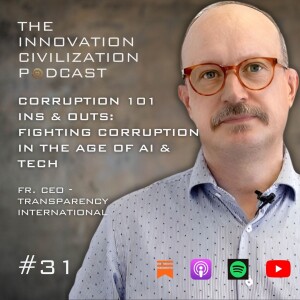
Sunday Feb 16, 2025
Sunday Feb 16, 2025
In this episode, we sat down with Daniel Eriksson, former CEO of Transparency International, to explore how corruption operates globally and what can be done to combat it.
Corruption is one of the most pervasive challenges facing the world today. But how do we dismantle it, especially when it's deeply entrenched in political systems?
Daniel has spearheaded anti-corruption initiatives across more than 100 countries, leading advocacy efforts to challenge corrupt systems, promote transparency, and hold the powerful accountable. From state capture to the misuse of emerging technologies, he sheds light on how corruption evolves and how we can fight back.
We dive deep into:
Understanding Corruption: Breaking down the types of corruption, from petty bribery to grand corruption and state capture.
The Role of Transparency International: How TI’s Corruption Perception Index works and its impact on global anti-corruption efforts.
Global North’s Role in Enabling Corruption: How countries like the UK and Switzerland facilitate money laundering from the Global South.
Emerging Technologies in the Fight Against Corruption: The potential of AI and blockchain to detect and prevent corrupt practices.
Success Stories: How Ukraine’s digital transformation has made it a leading example in anti-corruption during wartime.
Key Takeaways from the Episode:
1. Corruption Defined: Daniel Eriksson explains corruption as the abuse of entrusted power for personal gain, highlighting its various forms, from petty corruption to state capture.
2. Transparency as a Cure: Open data, digital public procurement, and accessible financial records are key to minimizing corruption, especially in high-risk sectors like defense and real estate.
3. The Global North’s Responsibility: Wealth stolen from the Global South often ends up in the Global North. Daniel calls for stronger regulations to prevent money laundering through real estate, anonymous shell companies, and financial systems.
4. The Power of AI and Blockchain: While blockchain remains underutilized, AI holds promise in analyzing large datasets to uncover hidden corruption, though challenges remain in its adoption.
5. Ukraine’s Anti-Corruption Journey: Despite being at war, Ukraine has climbed Transparency International’s corruption rankings through citizen-driven efforts, digitalization, and political will.
6. Challenges for Transitioning Countries: For countries like Bangladesh undergoing political transitions, Daniel advises focusing on high-impact sectors like public procurement to build transparency and trust.
7. Fighting State Capture: Addressing corruption at the highest levels requires systemic change, from legal reforms to digital transparency measures.
8. A Call for Global Action: Daniel emphasizes the need for democratic countries to block dirty money inflows and support global anti-corruption initiatives.
Join us in this compelling conversation with Daniel Eriksson as we explore the complexities of corruption and the tools we need to fight it.
Follow our host (@iwaheedo) for more insights on governance, transparency, and global development.
Timestamps:
(00:00) - Intro
(02:12) - What is Transparency International and how does it fight global corruption?
(03:07) - Is rooting out corruption the key to solving challenges in emerging markets?
(07:05) - What separates legal lobbying from political power hijacking and corruption?
(09:37) - How is the Corruption Perceptions Index constructed and what is it used for?
(12:00) - Is there a link between corruption, lack of democracy, and weak institutions?
(16:26) - Has global corruption increased, decreased, or remained the same over the past century?
(18:05) - What is the cause of state capture corruption?
(19:31) - How are emerging technologies reshaping the fight against corruption?
(22:30) - Is blockchain transforming anti-corruption efforts with smart contracts and transparency?
(29:08) - Can online tendering reduce corruption by increasing transparency?
(30:30) - What government data should be open or closed to minimize corruption?
(33:02) - Are large language models (LLMs) being used to combat corruption?
(39:02) - Is the future of anti-corruption driven by grassroots citizen efforts or top-down government initiatives?
(39:52) - What advice would you give to leaders of transition countries fighting corruption?
(44:38) - Does systemic anti-corruption reform focus on laws, people, or processes?
(47:49) - How can democratic leaders manage opposing forces when tackling systemic corruption?
(49:25) - How effective are anti-corruption commissions in fighting systemic corruption?
(52:12) - Could a national public dashboard of KPIs and finances revolutionize government transparency?
(57:09) - Do global north countries have incentives to stop illicit money inflows from corrupt elites?
(59:50) - Outro
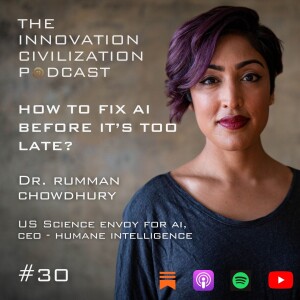
Sunday Feb 02, 2025
#30 - Dr. Rumman Chowdhury - How to Fix AI Before It's Too Late?
Sunday Feb 02, 2025
Sunday Feb 02, 2025
We're joined by the US Science Envoy for AI, Dr.Rumman Chowdhury, who's a leading expert in responsible AI. We uncover the ethical, technical, and societal implications of artificial intelligence.
As AI rapidly eats up the world, the question is what happens when it doesn’t align with human values? How do we navigate the risks of bias, misinformation, and hallucination in AI systems?
Dr. Chowdhury has been at the forefront of AI governance, red teaming, and AI risk mitigation. She has worked with global institutions, governments, and tech companies to make AI more accountable, safe, and equitable.
From her time at Twitter’s (now X) Machine Learning Ethics Transparency and Accountability team to founding Humane Intelligence, she has actively shaped policies that determine how AI interacts with human society.
We dive deep into:
- AI bias, disinformation, and manipulation: How AI models inherit human biases and what we can do about it.
- Hallucinations in AI: Why generative AI models fabricate information and why it’s not a bug but a feature.
- AI governance and regulation: Why unchecked AI development is dangerous, and the urgent need for independent audits.
- The risks of OpenAI, Meta, and big tech dominance: Who is really in control of AI, and how can we ensure fair oversight?
- How companies should approach AI ethics: Practical strategies businesses can use to prevent harm while innovating responsibly.
Key Takeaways from the Episode:
1. AI as a Tool, Not a Mind:
Dr. Rumman Chowdhury debunks the myth that AI is alive or sentient. AI is a tool—just like a hammer—it can be used to build or destroy. The real issue isn’t AI itself, but how humans choose to use it.
2. Why AI Hallucinations Are Unavoidable:
Unlike traditional machine learning models, generative AI doesn’t compute facts; it predicts what words statistically fit together. This means hallucinations—where AI completely fabricates information—are not a flaw, but an inherent feature of how these models work.
3. The Hidden Biases in AI Models:
AI models are only as good as their training data, which often reflects human biases. Dr. Chowdhury discusses how AI systems unintentionally amplify biases in hiring, finance, and law enforcement, and what needs to be done to fix it.
4. The Illusion of AI Objectivity:
Many assume AI models are neutral, but the truth is that all models are built with human input, which means they carry subjective biases. Dr. Chowdhury warns that the real danger is allowing a handful of tech elites to dictate how AI shapes global narratives.
5. The Need for AI Red Teaming & Auditing:
Just like cybersecurity stress tests, AI models need independent stress tests to identify risks before they cause harm. Dr. Chowdhury shares her experience leading global AI red teaming exercises with scientists and governments to assess AI’s real-world impact.
6. OpenAI and the Power Problem:
Is OpenAI truly aligned with public interest? Dr. Chowdhury critiques how AI giants hold more power than entire nations and explains why AI must be treated as a public utility rather than a corporate monopoly.
7. Why AI Needs More Public Oversight:
Most AI governance is self-imposed by the companies that build these models. Dr. Chowdhury calls for third-party, independent AI audits, similar to financial auditing, to ensure transparency and accountability in AI decision-making.
8. The Role of Governments vs. Private AI Firms:
With AI development largely controlled by private companies, what role should governments play? Dr. Chowdhury argues that governments must create AI Safety Institutes, set up national regulations, and empower independent researchers to hold AI accountable.
Timestamps:
(00:00) - Introduction to Dr. Rumman Chowdhury and AI ethics
(03:03) - Why AI is just a tool (and how it’s being misused)
(04:58) - The difference between machine learning, deep learning, and generative AI
(07:43) - Why AI hallucinations will never fully go away
(11:46) - AI misinformation and the challenge of verifying truth
(13:26) - The ethical risks of OpenAI and Meta’s control over AI
(18:20) - The role of red teaming in stress-testing AI models
(30:26) - Should AI be treated as a public utility?
(35:43) - Government vs. private AI oversight—who should regulate AI?
(37:22) - The case for third-party AI audits
(53:51) - The future of AI governance and accountability
(61:03) - Closing thoughts and how AI can be a force for good
Join us in this deep dive into the world of AI ethics, accountability, and governance with one of the field’s top leaders.
Follow our host (@iwaheedo) for more insights on technology, civilization, and the future of AI.

